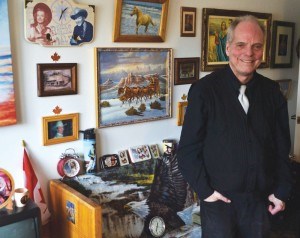
He’s been here for more than 44 years, but it wasn’t until recently that Jasper’s Ken Rice could officially call himself a Canadian.
Rice received his official citizenship last month—just a few months before his 65th birthday—but to hear him tell it, his heart has been painted red and white for almost as long as he can remember.
Rice’s father was an American and his mother Canadian. He was born in Washington, but in his younger days would visit his grandmother on her Fort Saskatchewan farm each summer.
Rice loved visiting the farm, and said that even at that time he hoped that one day he would become a Canadian citizen.
He took the first steps toward that goal in 1970. When he was 20 years old, Rice arrived in Calgary as a landed immigrant.
Shortly after that he got a job at the prison in Fort Saskatchewan. He worked there for about seven years, until he got a job at a nearby camera shop.
He can’t explain exactly why he didn’t move forward with his citizenship (when his Scottish wife arrived she went through the process right away), but since he was American he never really had a problem staying in the country.
In Fort Saskatchewan he and his wife had an acreage, but when she passed away he “lost all caring about that,” and took off to Texas, where he worked for a short time at a job he hated.
So, before long he found himself back in Canada, and it was around that time that he made his way to Jasper, where for 34 years he has left his mark on the community.
Rice is a pianist and volunteers playing the piano both at his church and the Alpine Summit Seniors Lodge. A firm believer in faith and respecting all denominations, Rice often pops up at Baptist, Anglican and Catholic services.
Many also know him as the “Mouse Man.” His home is bursting with mouse figurines. They sit on shelves, on the floor, on tables and just about every other flat surface. Rice is proud of his mice, and shows them off with the pride of a parent.
Ask any of his friends about him, and you’re sure to get a story about Rice playfully hiding little mice around his church, people’s pockets, or even in a loaf of bread.
Renata Muller is Rice’s good friend. She said she has never met anyone like him, and “has never had a friend like him.”
“He likes to tease people, but he would give you the shirt off his back,” she said, explaining that despite the fact that he is by no means rich he is still exceedingly generous.
But being beloved in a community still doesn’t make a person a legal citizen.
And as his 65th birthday approached, Rice realized that in order to get a pension he needed to be an official Canadian citizen. He also suffers from health complications, and wanted to make sure that his citizenship was taken care of while he was still healthy.
“One of the things was I didn’t want to get ill and pass away and wind up somewhere in the United States in some cemetery unknown, which would have happened,” he said.
He has been in Canada for so long that he didn’t think it would be a problem—he admitted that his own sister didn’t even know that he wasn’t Canadian—but the process turned out to be far more complicated than he imagined.
The piece of paper he had received in 1970 declaring him a landed immigrant had long ago disintegrated and officials weren’t prepared to accept his application without some form of documentation.
“I remember they told me: ‘if you don’t present this piece of paper that we’re demanding which has your picture on it and everything, you will be denied your citizenship and your permanent residency. We want that document.’”
So Rice went on an odyssey, getting advice from lawyers, friends and doctors. Eventually, with the help of Carla Gallop from Community Outreach Services, he got everything in line and took the trek to his citizenship hearing.
Rice said that even on the day he was sworn in, he wasn’t convinced everything would work out. He remembers officials making a fuss about the fact that he didn’t have his landed immigrant document, saying he couldn’t prove he had lived here all these years.
“They were basically saying that I’d been in Canada all these years and didn’t exist,” he said.
In the end, Rice said the letter Mark Addison, a local doctor, wrote testifying to Rice’s existence and long-time residence in Jasper helped him through.
“They were still talking about that original document that was destroyed, but then they read that long letter from Dr. Addison,” he said.
Eventually, everything was accepted. Rice remembers singing Oh Canada, and then finally feeling a sense of relief.
Mueller said that for Rice, getting his citizenship was a big deal. She remembered him being incredibly nervous that he wasn’t going to be accepted, and she knows it means the world to him that he can now officially call himself Canadian.
“After that he was just a changed man. You could see it in his demeanor, and he could talk about nothing else.
“It means a lot to him. He’s proud that he did become a citizen.”
Rice said that although nothing has really changed for him, knowing he is legally Canadian gives him peace of mind. The official letter sits under his glass coffee table in the middle of his living room, and he shows it off to anyone who comes to visit.
“I’ve always treasured the fact that one day I hoped I would become a Canadian—and I finally did. It just took a few days longer than most people,” he said.
“Now I have finally found my peace.”
Trevor Nichols
[email protected]
